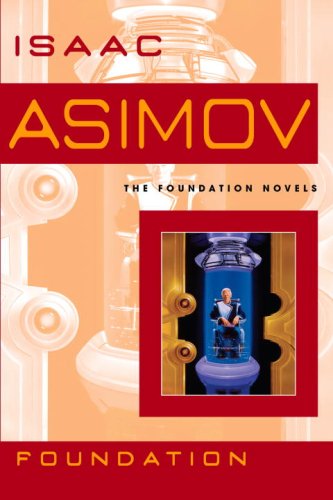All Nonfiction
- Bullying
- Books
- Academic
- Author Interviews
- Celebrity interviews
- College Articles
- College Essays
- Educator of the Year
- Heroes
- Interviews
- Memoir
- Personal Experience
- Sports
- Travel & Culture
All Opinions
- Bullying
- Current Events / Politics
- Discrimination
- Drugs / Alcohol / Smoking
- Entertainment / Celebrities
- Environment
- Love / Relationships
- Movies / Music / TV
- Pop Culture / Trends
- School / College
- Social Issues / Civics
- Spirituality / Religion
- Sports / Hobbies
All Hot Topics
- Bullying
- Community Service
- Environment
- Health
- Letters to the Editor
- Pride & Prejudice
- What Matters
- Back
Summer Guide
- Program Links
- Program Reviews
- Back
College Guide
- College Links
- College Reviews
- College Essays
- College Articles
- Back
Foundation by Isaac Asimov MAG
Written by none other than the grand master of science fiction and mystery, Foundation can be considered a modern classic. Isaac Asimov published the first three books in 1951, then three decades later surprised fans with three more astounding volumes.
Anyone familiar with Asimov's style will adore the series. It is written mainly in the twentieth-century science fiction style, which is very dependent on plot. He gives away only a piece of the puzzle, making you believe an illusion of the truth until the last second, when the story abruptly ends and leaves you dumfounded.
The book begins with Gaal, a young man from a backwater planet who has come to study psychohistory with the great Hari Seldon, creator of this math-based science that predicts the future using probability. The scene quickly switches to Seldon's trial, where he is accused of treason against the Galactic Empire. He pleads innocent, and explains that the Empire's reign will end in 500 years and a 30,000-year-long age of barbarism and ignorance will follow.
Seldon gathers the brightest minds and sends them to the Foundation, a nearly useless agricultural planet that is bullied by its powerful neighbors. Using psychohistory, Seldon predicts when “crises” will occur, and every few years a vault opens and plays a recording, steering the Foundation on the right track to avert disaster.
All the characters appear strange because they seem as if they're hiding something. Gaal is clever and humble but very gullible. Hardin, the mayor of the Foundation, is smart and always has a contingency plan. Ponyetts, a trader, will do anything to fulfill his quota.
Even though these books are written in the third person, Asimov reveals the plot through dialogue and action rather than thought. The books comprise small short stories relating to different crises, but from a new point of view. Each chapter is like another book, and nothing is ever repeated.
Foundation should be in your library.
Similar Articles
JOIN THE DISCUSSION
This article has 1 comment.

19 articles 0 photos 74 comments
Favorite Quote:
If you drown, at least die knowing you were headed for the shore.<br /> -Ray Bradbury